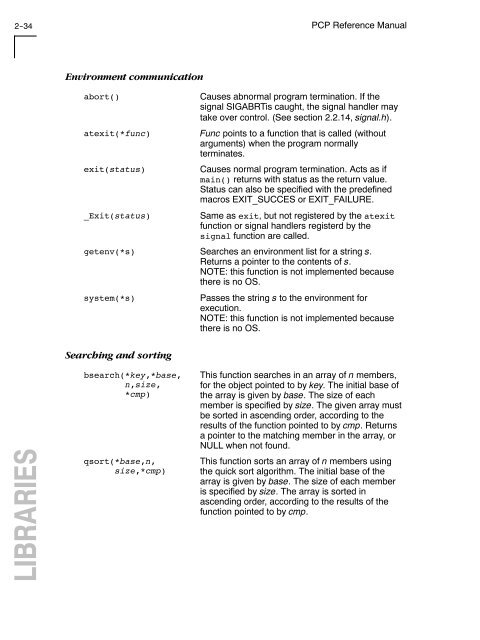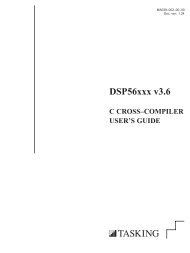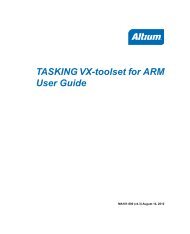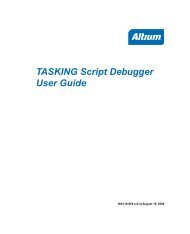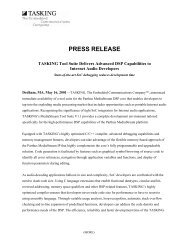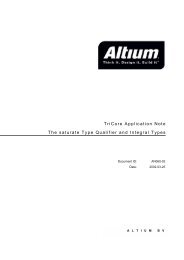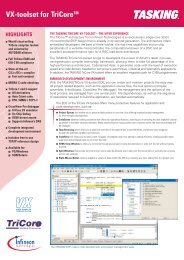- Page 1 and 2:
MB160−025−00−00Doc. ver.: 1.1
- Page 3 and 4:
The information in this document ha
- Page 5 and 6:
CONTENTSIVTable of ContentsCONTENTS
- Page 7 and 8:
VITable of Contents2.2.23 Unistd.h
- Page 9 and 10:
VIIITable of Contents8.6.3 Defining
- Page 11 and 12:
XPCP Reference ManualSHORT TABLE OF
- Page 13 and 14: XIIPCP Reference ManualCONVENTIONS
- Page 15 and 16: XIVPCP Reference ManualRELATED PUBL
- Page 17 and 18: C LANGUAGE1−2PCP Reference Manual
- Page 19 and 20: 1−4PCP Reference Manual1.2 DATA T
- Page 21 and 22: 1−6PCP Reference ManualConstraint
- Page 23 and 24: 1−8PCP Reference Manual1.5 INTRIN
- Page 25 and 26: 1−10PCP Reference ManualThe srpn
- Page 27 and 28: 1−12PCP Reference Manual#pragma n
- Page 29 and 30: 1−14PCP Reference ManualA weak de
- Page 31 and 32: C LANGUAGE1−16PCP Reference Manua
- Page 33 and 34: LIBRARIES2−2PCP Reference ManualC
- Page 35 and 36: 2−4PCP Reference Manual2.2 LIBRAR
- Page 37 and 38: 2−6PCP Reference ManualEZERO 0 No
- Page 39 and 40: 2−8PCP Reference ManualFE_DIVBYZE
- Page 41 and 42: 2−10PCP Reference Manual2.2.9 ISO
- Page 43 and 44: 2−12PCP Reference ManualMath.hTgm
- Page 45 and 46: 2−14PCP Reference ManualRemainder
- Page 47 and 48: LIBRARIES2−16PCP Reference Manual
- Page 49 and 50: 2−18PCP Reference Manual2.2.13 SE
- Page 51 and 52: 2−20PCP Reference Manual2.2.17 ST
- Page 53 and 54: 2−22PCP Reference ManualLow level
- Page 55 and 56: 2−24PCP Reference Manual# specifi
- Page 57 and 58: 2−26PCP Reference ManualLength sp
- Page 59 and 60: 2−28PCP Reference ManualLIBRARIES
- Page 61 and 62: 2−30PCP Reference ManualDirect in
- Page 63: LIBRARIES2−32PCP Reference Manual
- Page 67 and 68: LIBRARIES2−36PCP Reference Manual
- Page 69 and 70: 2−38PCP Reference ManualSearch fu
- Page 71 and 72: 2−40PCP Reference ManualTime mani
- Page 73 and 74: 2−42PCP Reference Manual2.2.23 UN
- Page 75 and 76: 2−44PCP Reference Manualwcrtomb(*
- Page 77 and 78: LIBRARIES2−46PCP Reference Manual
- Page 79 and 80: 3−2PCP Reference ManualASSEMBLY L
- Page 81 and 82: 3−4PCP Reference ManualOverview o
- Page 83 and 84: 3−6PCP Reference ManualOverview o
- Page 85 and 86: 3−8PCP Reference Manual@ATN(expre
- Page 87 and 88: 3−10PCP Reference Manual@DPTR(exp
- Page 89 and 90: 3−12PCP Reference Manual@LEN(stri
- Page 91 and 92: 3−14PCP Reference Manual@MSB(expr
- Page 93 and 94: 3−16PCP Reference Manual@SNH(expr
- Page 95 and 96: 3−18PCP Reference Manual3.3 ASSEM
- Page 97 and 98: 3−20PCP Reference ManualOverview
- Page 99 and 100: 3−22PCP Reference Manual.ALIASSyn
- Page 101 and 102: 3−24PCP Reference Manual.ASCII/.A
- Page 103 and 104: 3−26PCP Reference Manual.CALLSSyn
- Page 105 and 106: 3−28PCP Reference Manual.DEFINESy
- Page 107 and 108: 3−30PCP Reference Manual.DUPA / .
- Page 109 and 110: 3−32PCP Reference Manual.DUPF / .
- Page 111 and 112: 3−34PCP Reference Manual.ENDSynta
- Page 113 and 114: 3−36PCP Reference Manual.EXITMSyn
- Page 115 and 116:
3−38PCP Reference Manual.FAILSynt
- Page 117 and 118:
3−40PCP Reference Manual.FRACT/.S
- Page 119 and 120:
3−42PCP Reference Manual.IF / .EL
- Page 121 and 122:
3−44PCP Reference Manual.INCLUDES
- Page 123 and 124:
3−46PCP Reference Manual.MACRO /
- Page 125 and 126:
3−48PCP Reference Manual.MESSAGES
- Page 127 and 128:
3−50PCP Reference Manual.ORGSynta
- Page 129 and 130:
3−52PCP Reference Manual.PMACROSy
- Page 131 and 132:
3−54PCP Reference ManualData atti
- Page 133 and 134:
3−56PCP Reference Manual.SECTSynt
- Page 135 and 136:
3−58PCP Reference Manual.SIZESynt
- Page 137 and 138:
3−60PCP Reference Manual.TYPESynt
- Page 139 and 140:
3−62PCP Reference Manual.WARNINGS
- Page 141 and 142:
3−64PCP Reference Manual.WORD/.HA
- Page 143 and 144:
3−66PCP Reference Manual3.3.3 OVE
- Page 145 and 146:
3−68PCP Reference Manual$HW_ONLYS
- Page 147 and 148:
3−70PCP Reference Manual$LIST ON
- Page 149 and 150:
3−72PCP Reference Manual$LIST fla
- Page 151 and 152:
3−74PCP Reference Manual$OBJECTSy
- Page 153 and 154:
ASSEMBLY LANGUAGE3−76PCP Referenc
- Page 155 and 156:
3−78PCP Reference Manual$STITLESy
- Page 157 and 158:
3−80PCP Reference Manual$WARNING
- Page 159 and 160:
RUN−TIME4−2PCP Reference Manual
- Page 161 and 162:
4−4PCP Reference Manual4.4 HEAP A
- Page 163 and 164:
4−6PCP Reference Manual4.5.2 SPEC
- Page 165 and 166:
4−8PCP Reference ManualExample:#i
- Page 167 and 168:
4−10PCP Reference ManualNumerical
- Page 169 and 170:
RUN−TIME4−12PCP Reference Manua
- Page 171 and 172:
TOOL OPTIONS5−2PCP Reference Manu
- Page 173 and 174:
5−4PCP Reference Manual−? (−
- Page 175 and 176:
5−6PCP Reference Manual• An inl
- Page 177 and 178:
5−8PCP Reference Manual−C (−
- Page 179 and 180:
5−10PCP Reference Manual−−che
- Page 181 and 182:
5−12PCP Reference Manual−−cor
- Page 183 and 184:
TOOL OPTIONS5−14PCP Reference Man
- Page 185 and 186:
TOOL OPTIONS5−16PCP Reference Man
- Page 187 and 188:
TOOL OPTIONS5−18PCP Reference Man
- Page 189 and 190:
5−20PCP Reference Manual−f (−
- Page 191 and 192:
5−22PCP Reference Manual−g (−
- Page 193 and 194:
5−24PCP Reference Manual−H (−
- Page 195 and 196:
TOOL OPTIONS5−26PCP Reference Man
- Page 197 and 198:
5−28PCP Reference Manual−−inl
- Page 199 and 200:
5−30PCP Reference Manual−k (−
- Page 201 and 202:
5−32PCP Reference Manual−−mis
- Page 203 and 204:
5−34PCP Reference Manual−n (−
- Page 205 and 206:
5−36PCP Reference Manual−−no
- Page 207 and 208:
5−38PCP Reference Manual−−nov
- Page 209 and 210:
5−40PCP Reference ManualDefault
- Page 211 and 212:
5−42PCP Reference Manual−o (−
- Page 213 and 214:
TOOL OPTIONS5−44PCP Reference Man
- Page 215 and 216:
5−46PCP Reference Manual−−sig
- Page 217 and 218:
5−48PCP Reference Manual−t (−
- Page 219 and 220:
5−50PCP Reference Manual−u (−
- Page 221 and 222:
5−52PCP Reference Manual−w (−
- Page 223 and 224:
5−54PCP Reference Manual5.2 ASSEM
- Page 225 and 226:
5−56PCP Reference Manual−C (−
- Page 227 and 228:
5−58PCP Reference Manual−−che
- Page 229 and 230:
TOOL OPTIONS5−60PCP Reference Man
- Page 231 and 232:
TOOL OPTIONS5−62PCP Reference Man
- Page 233 and 234:
5−64PCP Reference Manual−−emi
- Page 235 and 236:
5−66PCP Reference Manual−−err
- Page 237 and 238:
5−68PCP Reference ManualExampleSu
- Page 239 and 240:
TOOL OPTIONS5−70PCP Reference Man
- Page 241 and 242:
5−72PCP Reference Manual−I (−
- Page 243 and 244:
5−74PCP Reference Manual−i (−
- Page 245 and 246:
5−76PCP Reference Manual−L (−
- Page 247 and 248:
5−78PCP Reference Manual−l (−
- Page 249 and 250:
5−80PCP Reference Manual−−no
- Page 251 and 252:
5−82PCP Reference Manual−o (−
- Page 253 and 254:
TOOL OPTIONS5−84PCP Reference Man
- Page 255 and 256:
TOOL OPTIONS5−86PCP Reference Man
- Page 257 and 258:
5−88PCP Reference Manual−−war
- Page 259 and 260:
5−90PCP Reference Manual−? (−
- Page 261 and 262:
5−92PCP Reference Manual−−cas
- Page 263 and 264:
5−94PCP Reference Manual−d (−
- Page 265 and 266:
TOOL OPTIONS5−96PCP Reference Man
- Page 267 and 268:
5−98PCP Reference Manual−−err
- Page 269 and 270:
5−100PCP Reference Manual−f (
- Page 271 and 272:
5−102PCP Reference Manual−−fi
- Page 273 and 274:
5−104PCP Reference Manual−i(−
- Page 275 and 276:
5−106PCP Reference Manual−L (
- Page 277 and 278:
5−108PCP Reference Manual−l (
- Page 279 and 280:
5−110PCP Reference Manual−−ls
- Page 281 and 282:
5−112PCP Reference Manual−M (
- Page 283 and 284:
TOOL OPTIONS5−114PCP Reference Ma
- Page 285 and 286:
5−116PCP Reference Manual−−mu
- Page 287 and 288:
5−118PCP Reference Manual−−no
- Page 289 and 290:
5−120PCP Reference Manual−O (
- Page 291 and 292:
5−122PCP Reference Manual−o (
- Page 293 and 294:
5−124PCP Reference Manual−r (
- Page 295 and 296:
5−126PCP Reference Manual−V (
- Page 297 and 298:
5−128PCP Reference Manual−w (
- Page 299 and 300:
5−130PCP Reference Manual5.4 CONT
- Page 301 and 302:
5−132PCP Reference Manual−−ad
- Page 303 and 304:
5−134PCP Reference Manual−−ca
- Page 305 and 306:
5−136PCP Reference Manual−−ch
- Page 307 and 308:
TOOL OPTIONS5−138PCP Reference Ma
- Page 309 and 310:
5−140PCP Reference Manual−−di
- Page 311 and 312:
5−142PCP Reference Manual−−er
- Page 313 and 314:
5−144PCP Reference Manual−f (
- Page 315 and 316:
5−146PCP Reference Manual−−fo
- Page 317 and 318:
5−148PCP Reference Manual−g (
- Page 319 and 320:
5−150PCP Reference Manual−−is
- Page 321 and 322:
5−152PCP Reference Manual−L (
- Page 323 and 324:
5−154PCP Reference Manual−l (
- Page 325 and 326:
5−156PCP Reference Manual−n (
- Page 327 and 328:
5−158PCP Reference Manual−−no
- Page 329 and 330:
5−160PCP Reference Manual−o (
- Page 331 and 332:
5−162PCP Reference Manual−−st
- Page 333 and 334:
5−164PCP Reference Manual−U (
- Page 335 and 336:
5−166PCP Reference Manual−v (
- Page 337 and 338:
5−168PCP Reference Manual−w (
- Page 339 and 340:
TOOL OPTIONS5−170PCP Reference Ma
- Page 341 and 342:
TOOL OPTIONS5−172PCP Reference Ma
- Page 343 and 344:
5−174PCP Reference Manual−aComm
- Page 345 and 346:
5−176PCP Reference Manual−d/−
- Page 347 and 348:
5−178PCP Reference Manual−errCo
- Page 349 and 350:
5−180PCP Reference Manual−GComm
- Page 351 and 352:
5−182PCP Reference Manual−KComm
- Page 353 and 354:
5−184PCP Reference Manual−mComm
- Page 355 and 356:
5−186PCP Reference Manual−nComm
- Page 357 and 358:
5−188PCP Reference Manual−qComm
- Page 359 and 360:
5−190PCP Reference Manual−SComm
- Page 361 and 362:
5−192PCP Reference Manual−tComm
- Page 363 and 364:
TOOL OPTIONS5−194PCP Reference Ma
- Page 365 and 366:
5−196PCP Reference Manual−wComm
- Page 367 and 368:
5−198PCP Reference Manual−?Comm
- Page 369 and 370:
5−200PCP Reference Manual−fComm
- Page 371 and 372:
5−202PCP Reference Manual−mComm
- Page 373 and 374:
5−204PCP Reference Manual−rComm
- Page 375 and 376:
5−206PCP Reference Manual−tComm
- Page 377 and 378:
5−208PCP Reference Manual−xComm
- Page 379 and 380:
TOOL OPTIONS5−210PCP Reference Ma
- Page 381 and 382:
6−2PCP Reference ManualLIST FILE
- Page 383 and 384:
6−4PCP Reference ManualCODECYCLES
- Page 385 and 386:
6−6PCP Reference Manual**********
- Page 387 and 388:
6−8PCP Reference ManualThe meanin
- Page 389 and 390:
6−10PCP Reference ManualSpaceThe
- Page 391 and 392:
LIST FILE FORMATS6−12PCP Referenc
- Page 393 and 394:
7−2PCP Reference ManualOBJECT FOR
- Page 395 and 396:
7−4PCP Reference Manual7.2 MOTORO
- Page 397 and 398:
7−6PCP Reference ManualExample:S3
- Page 399 and 400:
7−8PCP Reference Manual7.3 INTEL
- Page 401 and 402:
7−10PCP Reference ManualExample::
- Page 403 and 404:
OBJECT FORMATS7−12PCP Reference M
- Page 405 and 406:
8−2PCP Reference ManualLINKER SCR
- Page 407 and 408:
8−4PCP Reference ManualSee sectio
- Page 409 and 410:
8−6PCP Reference ManualSkeleton o
- Page 411 and 412:
8−8PCP Reference Manual8.3.4 EXPR
- Page 413 and 414:
8−10PCP Reference Manualexists()i
- Page 415 and 416:
8−12PCP Reference Manual• The m
- Page 417 and 418:
8−14PCP Reference Manualspace_pro
- Page 419 and 420:
8−16PCP Reference Manual• A cor
- Page 421 and 422:
8−18PCP Reference Manualsection_s
- Page 423 and 424:
8−20PCP Reference Manualaddr_abso
- Page 425 and 426:
8−22PCP Reference Manual8.5 SEMAN
- Page 427 and 428:
8−24PCP Reference Manual8.5.2 DEF
- Page 429 and 430:
8−26PCP Reference ManualSee secti
- Page 431 and 432:
8−28PCP Reference Manual• The s
- Page 433 and 434:
8−30PCP Reference Manual8.6 SEMAN
- Page 435 and 436:
8−32PCP Reference ManualIf the ar
- Page 437 and 438:
8−34PCP Reference Manual8.7 SEMAN
- Page 439 and 440:
8−36PCP Reference Manual8.7.3 DEF
- Page 441 and 442:
8−38PCP Reference Manual8.8 SEMAN
- Page 443 and 444:
8−40PCP Reference Manual8.8.2 CRE
- Page 445 and 446:
8−42PCP Reference ManualFor examp
- Page 447 and 448:
8−44PCP Reference ManualFor each
- Page 449 and 450:
8−46PCP Reference ManualThe prope
- Page 451 and 452:
8−48PCP Reference Manualgroup ( .
- Page 453 and 454:
8−50PCP Reference ManualLINKER SC
- Page 455 and 456:
8−52PCP Reference Manual8.8.5 CON
- Page 457 and 458:
MISRA−C9−2PCP Reference ManualC
- Page 459 and 460:
9−4PCP Reference ManualMISRA−C1
- Page 461 and 462:
9−6PCP Reference ManualMISRA−C4
- Page 463 and 464:
9−8PCP Reference ManualMISRA−C8
- Page 465 and 466:
9−10PCP Reference Manual9.2 MISRA
- Page 467 and 468:
9−12PCP Reference ManualIdentifie
- Page 469 and 470:
9−14PCP Reference ManualArithmeti
- Page 471 and 472:
9−16PCP Reference Manual12.12 (R)
- Page 473 and 474:
9−18PCP Reference Manual16.5 (R)
- Page 475 and 476:
9−20PCP Reference Manual19.13 (A)
- Page 477 and 478:
MISRA−C9−22PCP Reference Manual
- Page 479 and 480:
INDEXIndex−2IndexINDEX
- Page 481 and 482:
Index−4IndexINDEXlisting controls
- Page 483 and 484:
Index−6IndexINDEXatoi, 2−32atol
- Page 485 and 486:
Index−8IndexINDEX−Wc, 5−167
- Page 487 and 488:
Index−10IndexINDEXmath.h, 2−11s
- Page 489 and 490:
Index−12IndexINDEXderivative defi
- Page 491 and 492:
Index−14IndexINDEXmessage, 1−11
- Page 493 and 494:
Index−16IndexINDEXsin functions,
- Page 495:
Index−18Indexwscanf, 2−28wstrft


